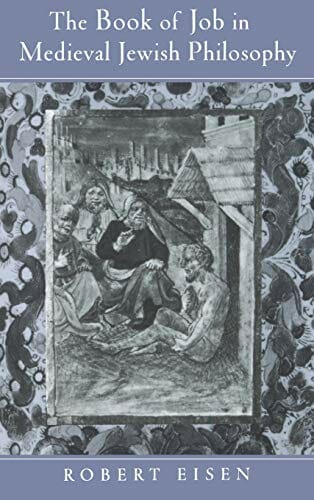
Publisher: Oxford University Press; 1st edition
Publication date: September 16, 2004
Print length: 336 pages
Buy Now:
The Book of Job in Medieval Jewish Philosophy
Medieval Jewish philosophers have been studied extensively by modern scholars, but even though their philosophical thinking was often shaped by their interpretation of the Bible, relatively little attention has been paid to them as biblical interpreters. In this study, Robert Eisen breaks new ground by analyzing how six medieval Jewish philosophers approached the Book of Job. These thinkers covered are Saadiah Gaon, Moses Maimonides, Samuel ibn Tibbon, Zerahiah Hen, Gersonides, and Simon ben Zemah Duran.
Eisen explores each philosopher’s reading of Job on three levels: its relationship to interpretations of Job by previous Jewish philosophers, the way in which it grapples with the major difficulties in the text, and its interaction with the author’s systematic philosophical thought. Eisen also examines the resonance between the readings of Job of medieval Jewish philosophers and those of modern biblical scholars.
What emerges is a portrait of a school of Joban interpretation that was creative, original, and at times surprisingly radical. Eisen thus demonstrates that medieval Jewish philosophers were serious exegetes whom scholars cannot afford to ignore. By bringing a previously-overlooked aspect of these thinkers’ work to light, Eisen adds new depth to our knowledge of both Jewish philosophy and biblical interpretation.
Praise
Robert Eisen’s The Book of Job in Medieval Jewish Philosophy is the first attempt to evaluate the rich and fascinating tradition of Job exegesis in medieval Jewish philosophy. With clarity and insight, Eisen shows how six Jewish philosophers grappled with the challenging enigmas of the Book of Job. A learned and thought-provoking book!
Department of Jewish Thought, The Hebrew University of Jerusalem
The Book of Job is a classic in Western literature, developing all the themes that perenially trouble us: providence, the origin of evil, the justice of God, and human suffering. There is no book comparable to Robert Eisen’s The Book of Job in Medieval Jewish Philosophy, which seems strange since the Book of Job was so important to the thinking of medieval Jewish philosophy on precisely these questions. Analyzing the thought of six thinkers from Saadiah Gaon to Simon ben Zemah Duran, Eisen carefully examines their commentaries and thinking on Job. He does a masterful job of bringing these important texts to light. This is an important book for anyone interested in medieval philosophy, the history of exegesis, and the major issues of suffering, God, and justice.
The Divinity School, The University of Chicago